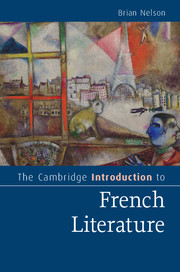Book contents
- Frontmatter
- Dedication
- Contents
- Preface
- Acknowledgements
- Chronology
- 1 Villon: a dying man
- 2 Rabelais: the uses of laughter
- 3 Montaigne: self-portrait
- 4 Corneille: heroes and kings
- 5 Racine: in the labyrinth
- 6 Molière: new forms of comedy
- 7 La Fontaine: the power of fables/fables of power
- 8 Madame de Lafayette: the birth of the modern novel
- 9 Voltaire: the case for tolerance
- 10 Rousseau: man of feeling
- 11 Diderot: the enlightened sceptic
- 12 Laclos: dangerous liaisons
- 13 Stendhal: the pursuit of happiness
- 14 Balzac: ‘All is true’
- 15 Hugo: the divine stenographer
- 16 Baudelaire: the streets of Paris
- 17 Flaubert: the narrator vanishes
- 18 Zola: the poetry of the real
- 19 Huysmans: against nature
- 20 Mallarmé: the magic of words
- 21 Rimbaud: somebody else
- 22 Proust: the self, time and art
- 23 Jarry: the art of provocation
- 24 Apollinaire: impresario of the new
- 25 Breton … Company: Surrealism
- 26 Céline: night journey
- 27 Sartre: writing in the world
- 28 Camus: a moral voice
- 29 Beckett: filling the silence
- 30 French literature into the twenty-first century
- Notes
- Further reading
- Index of authors and titles
- Index of genres, movements and concepts
- Cambridge Introductions to …
- References
17 - Flaubert: the narrator vanishes
Published online by Cambridge University Press: 05 July 2015
- Frontmatter
- Dedication
- Contents
- Preface
- Acknowledgements
- Chronology
- 1 Villon: a dying man
- 2 Rabelais: the uses of laughter
- 3 Montaigne: self-portrait
- 4 Corneille: heroes and kings
- 5 Racine: in the labyrinth
- 6 Molière: new forms of comedy
- 7 La Fontaine: the power of fables/fables of power
- 8 Madame de Lafayette: the birth of the modern novel
- 9 Voltaire: the case for tolerance
- 10 Rousseau: man of feeling
- 11 Diderot: the enlightened sceptic
- 12 Laclos: dangerous liaisons
- 13 Stendhal: the pursuit of happiness
- 14 Balzac: ‘All is true’
- 15 Hugo: the divine stenographer
- 16 Baudelaire: the streets of Paris
- 17 Flaubert: the narrator vanishes
- 18 Zola: the poetry of the real
- 19 Huysmans: against nature
- 20 Mallarmé: the magic of words
- 21 Rimbaud: somebody else
- 22 Proust: the self, time and art
- 23 Jarry: the art of provocation
- 24 Apollinaire: impresario of the new
- 25 Breton … Company: Surrealism
- 26 Céline: night journey
- 27 Sartre: writing in the world
- 28 Camus: a moral voice
- 29 Beckett: filling the silence
- 30 French literature into the twenty-first century
- Notes
- Further reading
- Index of authors and titles
- Index of genres, movements and concepts
- Cambridge Introductions to …
- References
Summary
From the point of view of pure Art, you could almost establish it as an axiom that the subject is irrelevant, style itself being an absolute way of seeing things.
– Flaubert, Letter to Louise Colet, 16 Jan. 1852Gustave Flaubert (1821–80) was as influential in the field of fiction as Baudelaire was in poetry. His role in the evolution of the French novel is a subversive one. By shifting the novelist's emphasis from representation to composition, he began to undo the realist novel from within. His two great novels of contemporary life, Madame Bovary (1857) and Sentimental Education (L'Éducation sentimentale, 1869) adhere to a realist framework. They focus on mundane, antiheroic characters and contain an abundance of seemingly objective descriptions of settings and social milieus. What distinguishes Flaubert from Balzac and the ‘realist’ novelists of his own generation are his stylistic innovations and his self-consciousness as a writer. It is these aspects of his work that situate him on the dividing line between realism and the experimental writing of modernism, and account for his reputation as the creator of the ‘modern’ self-reflexive novel.
‘What I would like to write,’ Flaubert declared with provocative hyperbole, ‘is a book about nothing, a book dependent on nothing external, which would be held together by the inner strength of its style’ (letter to Louise Colet, 16 Jan. 1852). This statement indicates his ambition to give narrative prose the autonomy of stylization and the expressive qualities of poetry, and thereby to establish the novel as the dominant literary form of the nineteenth century. His narrative method has been called ‘impersonal’, by which is meant a kind of self suppression by the author – an implicit repudiation of the Romantic notions of creative inspiration and intense self-expression. For Flaubert, the presence of the writer in his work should remain elusive. Whereas the narrator of a Balzac novel is overtly (and often ostentatiously) omniscient, Flaubert's stated ideal was a different kind of God-like narrator, one who would be ‘present everywhere but visible nowhere’ (9 Dec. 1852).
- Type
- Chapter
- Information
- The Cambridge Introduction to French Literature , pp. 122 - 131Publisher: Cambridge University PressPrint publication year: 2015

